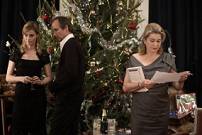|
|
||||
|
|
by Donald Levit  Appearing with Catherine Deneuve at the final New York Film Festival media-industry screening and press conference, Arnaud Desplechin found food for thought in questions regarding A Christmas Tale/Un conte de Noël. Like a Tolstoy who probed deeper, fell for his heroine and sensed the oversimplification in the famous opening en famille either/or, the director-cowriter began with a house, a reunion at Christmastime, and then began to put idiosyncratic flesh on his characters, who took off on their own. Seriocomic in conception, filled with breathing beings who react in permutations and combinations, the film runs too long at two-and-a-half hours, depends unnecessarily on printed date-time titles and inconsistently intrudes extra-dramatic head-on camera confessions, while it resorts to a tried-and-true situation albeit with a novel reason behind it. That reason is death, or, rather, life lived with intimations of mortality. Painful death, and the possibility of life’s giving the gift of itself in a bone marrow transplant, is present from the start, even if in a cemetery paterfamilias Abel Vuillard (Jean-Paul Roussillon) claims that, “a leaf fallen from me as from a tree,” son Joseph no longer factors in. That firstborn of Abel and younger wife Junon (Deneuve) died at six of Burkitt’s lymphoma, and neither parents’ nor sister Elizabeth’s organs are compatible for transplant, nor are those of Henri, conceived then in hopes of salvation. To surviving sister and brother were added another blood sibling, Ivan, and orphaned nephew Simon. Grown, the four are now fled from the nest where the loving parents live among childhood photographs and comfortable furnishings. The disease is partly genetic, for Junon is diagnosed with leukemia and, chemotherapy not an option, a call goes to children and grandchildren, to assemble for a weekend gathering and to be tested as potential donors. They arrive, the adult children with their own kids and emotional baggage in tow, with a current lover and memories of love lost. The resultant reconnecting and the sparring that result are pictured with care and humor in this quiet home that might be from the intimate paintings of Édouard Vuillard. Elizabeth (Anne Consigny) is distant from her traveling husband Claude (Hippolyte Girardot), worried about her perpetual sadness and protective of her emotionally fragile, friendless sixteen-year-old, Paul (Emile Berling). She had “banished” alcoholic druggie Henri (Mathieu Amalric) from family contact after she and their father had bailed him out from the fraudulent sale of a theater he did not own, an act Abel saw as moral duty though a judge inconsistently ruled out any legal responsibility (for the father is mentioned as guarantor). Henri shows up with girlfriend Faunia (Emmanuelle Devos), whose understanding is praised but not demonstrated and whose secular Jewishness is extraneous -- a question about Hebrew symbols drew a blank from director and actress -- except as unnoted explanation for her own family’s insistent non-celebration non-gift-giving. Youngest son Ivan (Melvil Poupaud) arrives with wife Sylvia (Chiara Mastroianni, Denueve’s daughter by Marcello Mastroianni) and their two interchangeable cutesy boys (Thomas and Clément Obled, as Basile and Baptiste), lonely artist Simon (Laurent Capelluto) is present with his sadness about this woman he and Henri “gave” to Ivan, and mathematician Claude comes and presents a comic actuarial chalkboard lesson on cancer treatment and odds. In many short scenes of reconnection, reminiscing, cold-shouldering, feuding, and one outright but funny fight, the family members have at one another and at themselves. Additional complication arises when tests turn up that only two qualify as donors for mother Junon: Paul and Henri, prompting the uncle to remark to the nephew that at least this shows he is indeed the biological son of the mother who has biting remarks for him, surprising but only half-serious. “Ensemble” in that players and stories all contribute rather than being subservient to one star or thread, A Christmas Tale finds time for bits that have no reason but strike home as true, like a semi-drunken climb out a window and across roofs instead of using the stairs. Charming, too, is Sylvia’s might-have-been, once-only gift of healing (and her spouse’s acceptance), and there is reality in (Released by IFC Films; not rated by MPAA.) |
||
|
© 2026 - ReelTalk Movie Reviews Website designed by Dot Pitch Studios, LLC |



